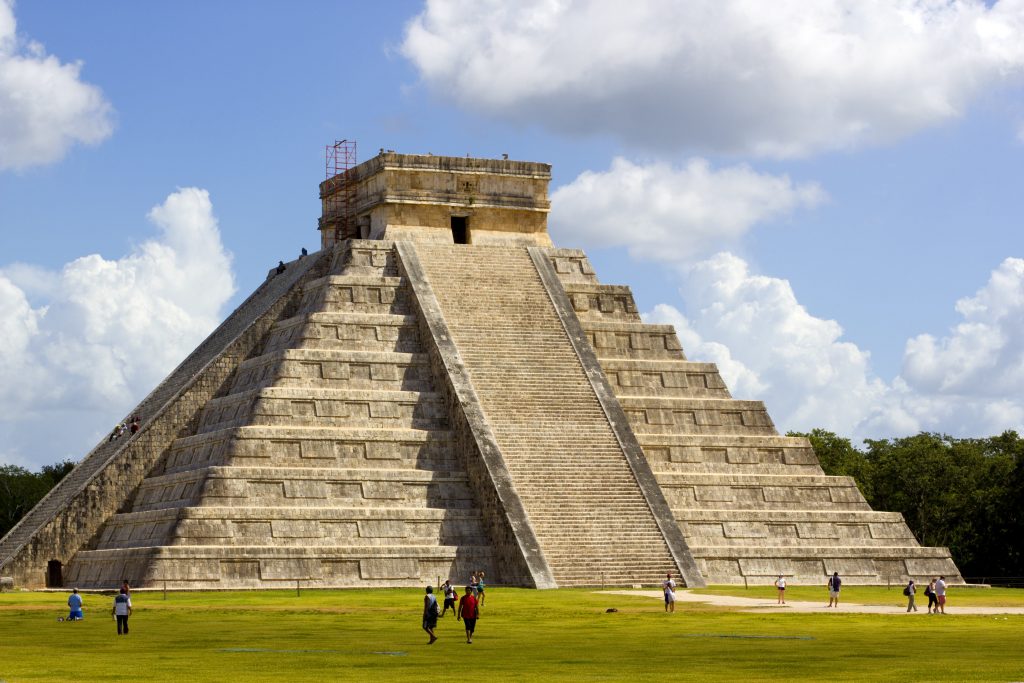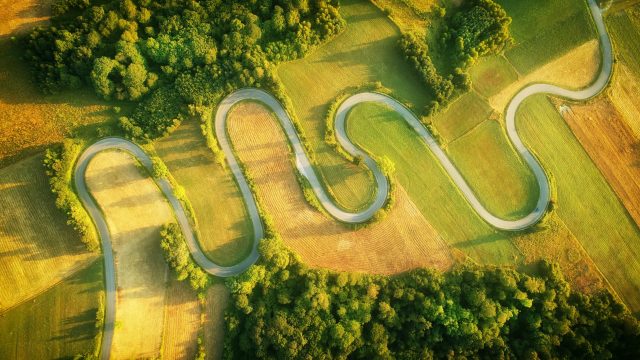Mexico ranks sixth in the world for UNESCO World Heritage Sites. It’s no doubt that the many Mayan ruins contribute to this. The Mayans were an advanced Mesoamerican civilisation in Pre-Columbian Mexico. They produced the only known developed writing system, a hieroglyphic script, of the time. In Mexico, evidence mostly bases them in the south-east. Findings date their civilisation back as early as 2000BC. During a trip to Mexico, it’s worth visiting one or more of these ruins. You may even wish to base your whole holiday around them! Find out more about the fantastic architecture and lifestyle. Bear in mind that many tour buses visit these Mayan ruins, so set off in your hire car as early as possible.
 Chichen Itza. Photo by: dementevajulia/Adobe Stock
Chichen Itza. Photo by: dementevajulia/Adobe Stock
1. El Rey
This site is perfect if you’re staying in Cancun and only have a little spare time to explore a ruin. This is by far the closest and easiest of the Mayan ruins to access. This settlement was on the Mayan trade route. It also acted as a burial ground for royals and a centre for education on astronomy. A small temple is onsite and ceremonial platforms. There’s also bases of other structures to walk amongst. Take advantage of a tour guide to fully discover the history of the site. Many iguanas also visit!
2. Chichen Itza
Probably by far the most well-known of the Mayan ruins in Mexico, this is the second most visited archaeological site in the country. The 30-metre high El Castillo pyramid has been named one of the new Seven Wonders of the World.
It was designed with astronomical significance. The stairways on each face contain 91 steps. The total number of steps is 365 with the shared step at the top. Unfortunately, climbing the pyramid was banned in 2006. On the spring and autumn equinoxes, the sun casts a shadow out from the pyramid that forms a serpent on the ground. The daily light show (enable Google Translate to view the site in English) helps recreate this so it can be seen all year.
Other structures of note include the Observatory and Temple of the Warriors. The Great Ball Court is the largest and best preserved of its kind.
3. Ek Balam
These climbable Mayan ruins are located near Valladolid. The entire settlement covers 12 square kilometres but only 1 square mile can be viewed. The centre itself has been excavated. The site was in operation for over 1000 years. 45 structures here have been mapped. These include several temples, two palaces, and a central pyramid. El Torre, the main tower, is one of the largest Mayan structures in the Yucatán. It’s worth a visit for the unique intricate and decorative motifs.
 Part of the ruins at Tulum. Photo by: diegograndi/Adobe Stock
Part of the ruins at Tulum. Photo by: diegograndi/Adobe Stock
4. Tulum
The Tulum ruins is what’s left of the only Mayan settlement on a Caribbean beach. Trade routes met here ready for goods to be distributed inland or across the sea. Its stunning location probably explains why it’s the most frequently visited ruin in the Yucatán peninsula. The population survived around 70 years after the Spanish invasion. Eventually diseases brought to the country led to its abandonment. Around 50 identified structures represent a tenth of the original city.
5. Coba
This settlement was formed around two lagoons. It’s set in jungle scenery and has climbable temples. Although first discovered in the mid-1800s, it was later that further exploration took place due to restraints imposed by funding, the Caste War, and the dense jungle environment. The highest Mayan pyramid in the Yucatan, Nohoch Mul, is found here. 120 steps will take you up 137 feet. It’s estimated that there are over 6000 structures but only three have been excavated for public viewing. Unlike other excavated ruins, Coba consists of three separate settlements, rather than one, joined by roads, or sacbes. These roads are made of a white limestone rock to reflect the moonlight in the dark and make it easier to walk along.
6. Uxmal
The name translates as ‘thrice built’, referring to the number of times the pyramid has had to be rebuilt. Uxmal is a UNESCO World Heritage Site. The 38-metre-tall Adivino or ‘Pyramid of the Magician’ has an unusual oval-shaped base. Other highlights include a 30-metre-tall Grand Pyramid, ball court, and Governor’s Palace. The site is considered the most representative of Mayan architecture with some delightful examples available to view. There are hotels located nearby, such as the Uxmal Resort Maya, for those wishing to make the most of their visit to the area. As with Chichen Itza, a light show is put on in the evenings.
7. Calakmul
Located 22 miles from the Guatemalan border, this is another UNESCO World Heritage Site and sits inside the UNESCO Biosphere (an area preserved to promote sustainable living and conservation). There are believed to be around 6700 structures within the site covering a total of 70 square kilometres. The pyramid is one of the tallest Mayan examples. It has some great views standing at over 45 metres high so worth a climb to the top. The onsite museum teaches visitors all they need to know about the history and massive influential power of Calakmul. There are examples of murals and stelae (tall sculptured stone shafts) to see.
 Pyramid of the Magician at Uxmal. Photo by: Martin M303/Adobe Stock
Pyramid of the Magician at Uxmal. Photo by: Martin M303/Adobe Stock
Hiring a car in Mexico to discover Mayan ruins
This is the best way to make sure you can reach the ruins at the time of day you want, rather than depend on another service. With a hire car, you can fit as much or as little into your day as you wish.
We currently work with the suppliers America Car Rental, Europcar, and Goldcar in Mexico. Cars can be collected from Cancun Airport from any of these suppliers.
Have you visited the Mayan ruins? Let us know your highlights in the comments below. Are you planning a trip to Mexico? Let us know what’s on your itinerary!
Written by Jessica Juby.
Make sure you follow us on Twitter and Facebook for the latest travel tips and news.
Subscribe to our newsletter
Want our blogs emailed direct to you? Sign up below to get updates featuring our blogs and car hire top tips. Receive the best deals on car hire straight to your inbox.





